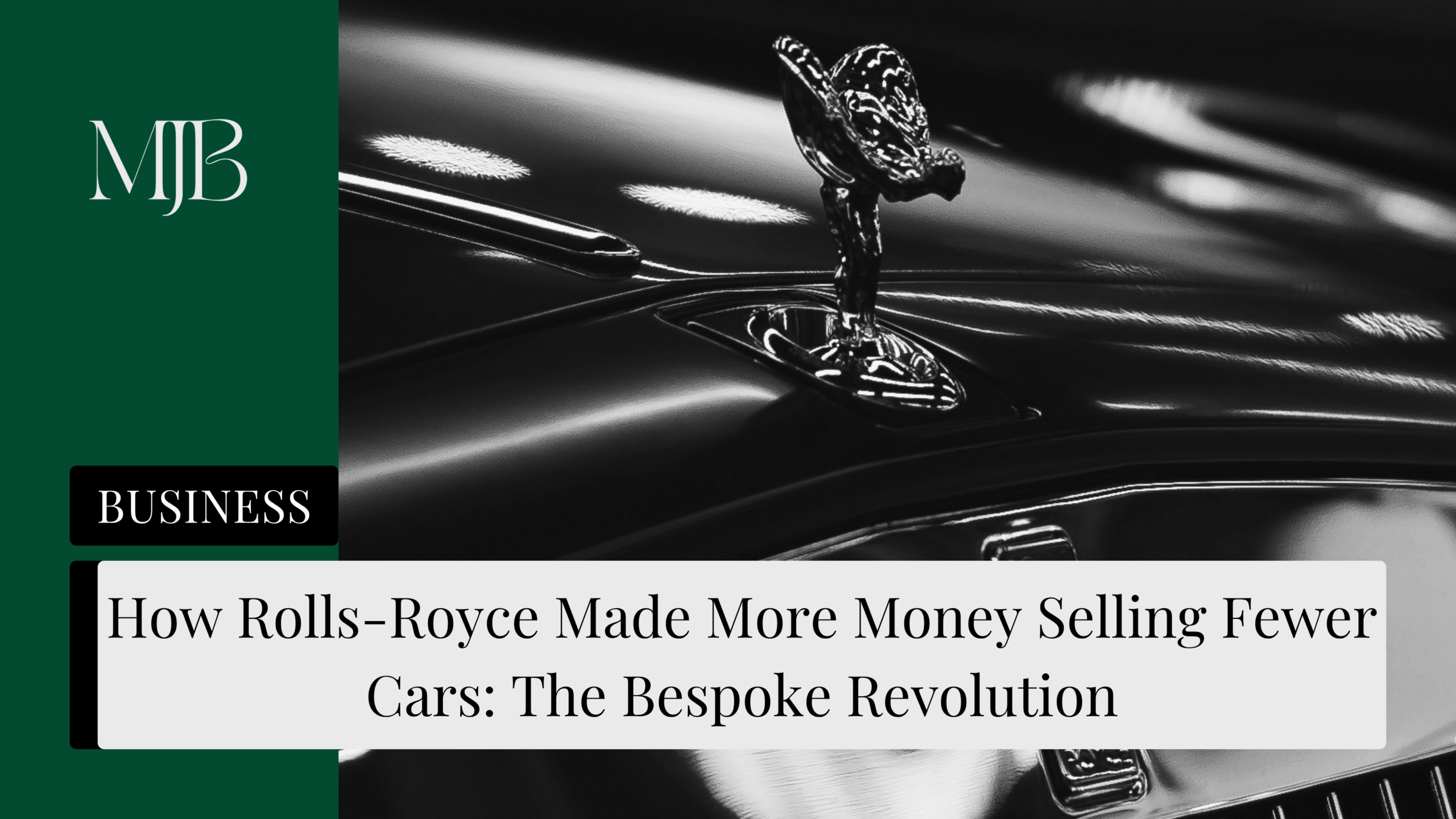When you’re selling cars that cost more than most people’s houses, volume isn’t everything. Rolls-Royce just proved this point brilliantly – their 2024 results show profits jumped 4.6% to £134.7m even as they sold fewer cars. The secret? Ultra-wealthy buyers are going absolutely wild for bespoke customisation, pushing the luxury car market into uncharted territory.
Here’s what’s driving this fascinating shift in luxury automotive economics, and why it matters for the broader premium goods sector.
Bespoke Cars Drive Record Profits
Rolls-Royce’s bespoke service hit a 120-year high in 2024, with demand surging 10% year-on-year. Think of it as the automotive equivalent of commissioning a custom Rolex – except your “watch” happens to be a £400,000+ car with hand-stitched leather and personalised everything.
The numbers tell the story perfectly. While sales dropped from 6,032 to 5,712 cars (still their third-best year ever), revenue only fell slightly from £984.2m to £978.9m. That’s because each car generated significantly more profit through high-margin customisation options.
Why Rich Buyers Want Ultra-Personal Cars
The psychology here is fascinating. When you’ve got serious money, you’re not just buying transportation – you’re buying exclusivity and personal expression. Rolls-Royce customers are essentially saying: “I don’t want the same car as the other billionaire down the street.”
This trend is so strong that Rolls-Royce announced a £300m+ expansion of their Goodwood factory in January 2025, specifically to handle more complex customisation requests. We’re talking about everything from custom paint colours mixed to match your yacht to interior trim made from wood from your family estate.
The company’s board put it eloquently: they’re “creating value for clients through highly individualised products and experiences.” In plain English? Rich people will pay astronomical premiums for stuff that’s uniquely theirs.
Market Outlook: Cautiously Optimistic Despite Headwinds
Despite the strong performance, Rolls-Royce isn’t popping champagne bottles just yet. Economic uncertainties, trade tariff concerns, and geopolitical tensions have them taking a “cautiously optimistic” stance for 2025.
But here’s the thing about luxury goods – they often weather economic storms better than mass-market products. When you’re already spending £500,000 on a car, an extra £50,000 for bespoke features doesn’t feel like a huge stretch.
The Broader Luxury Trend: Bentley Sees Similar Pattern
Rolls-Royce isn’t alone in this bespoke bonanza. Rival Bentley Motors reported similar trends, with record demand for personalised models driving their highest-ever revenue per car (up 10% year-on-year) despite overall challenges.
Bentley’s results were more mixed – their operating profit dropped from €589m to €373m – but that was mainly due to weaker Chinese demand rather than any fundamental shift away from customisation. The personalisation trend clearly transcends individual brands.
What This Means for Luxury Markets
This shift toward ultra-personalisation in luxury cars signals a broader trend across premium goods. Whether it’s custom watches, bespoke suits, or personalised yachts, wealthy consumers are increasingly willing to pay massive premiums for uniqueness.
For investors and market watchers, the lesson is clear: in luxury goods, margin expansion through customisation can matter more than volume growth. Companies that master this balance – fewer units, higher profits per unit – often outperform those chasing pure sales numbers.
FAQ
Q1: How much more do bespoke Rolls-Royce cars cost compared to standard models?
A: While Rolls-Royce doesn’t publish exact figures, industry experts estimate bespoke options can add 20-50% to a car’s base price. Given their standard models start around £300,000-£400,000, we’re talking serious money for customisation.
Q2: Why did Rolls-Royce sales drop in 2024 despite strong demand?
A: The company prioritised higher-margin bespoke orders over volume sales. They’re deliberately making fewer cars but extracting more profit from each one through personalisation services.
Q3: Is the bespoke car trend sustainable long-term?
A: The trend appears robust given that wealthy individuals continue to seek exclusivity. However, economic downturns or luxury spending shifts could impact demand for ultra-premium customisation.
Q4: How does Rolls-Royce’s performance compare to other luxury brands?
A: The focus on bespoke services mirrors trends across luxury goods, from custom watches to personalised jets. Bentley reported similar patterns, suggesting this is an industry-wide shift rather than company-specific.
Q5: What’s driving the expansion of Rolls-Royce’s Goodwood factory?
A: The £300m+ investment is specifically designed to handle increased demand for complex customisation. They need more space and specialised craftspeople to meet bespoke orders that can take months to complete.
DISCLAIMER
Effective Date: 15th July 2025
The information provided on this website is for informational and educational purposes only and reflects the personal opinions of the author(s). It is not intended as financial, investment, tax, or legal advice.
We are not certified financial advisers. None of the content on this website constitutes a recommendation to buy, sell, or hold any financial product, asset, or service. You should not rely on any information provided here to make financial decisions.
We strongly recommend that you:
- Conduct your own research and due diligence
- Consult with a qualified financial adviser or professional before making any investment or financial decisions
While we strive to ensure that all information is accurate and up to date, we make no guarantees about the completeness, reliability, or suitability of any content on this site.
By using this website, you acknowledge and agree that we are not responsible for any financial loss, damage, or decisions made based on the content presented.






